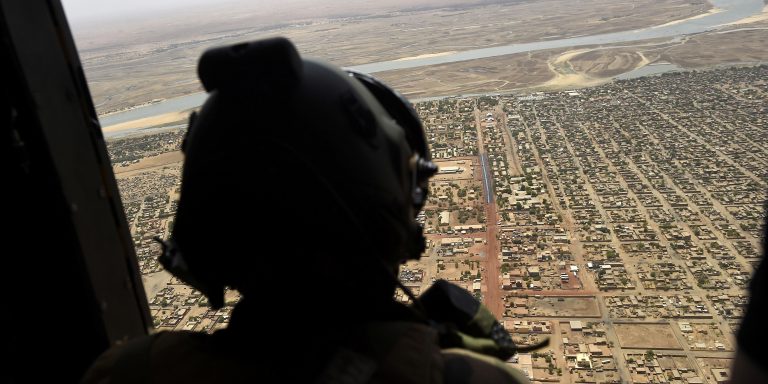INTELBRIEF
October 4, 2021
IntelBrief: Jihadist Groups Continue to Consolidate Territory Throughout West Africa

Bottom Line Up Front
- Events and turmoil in Afghanistan have shifted focus away from West African jihadist groups for much of this year.\
- The elimination of nearly all leaders of West African jihadist groups in recent months has done little to diminish their operational capabilities.
- Fratricidal conflict between Nigerian jihadist groups has failed to reduce the strength of Islamic State in West Africa Province (ISWAP).
- France’s wavering about withdrawing from the Sahel has led to the introduction of Russian mercenaries in the region as a new factor to consider.
Amid the Taliban’s conquests and attacks by the Islamic State Khorasan (ISK) in Afghanistan, Western counterterrorism focus has shifted away from West Africa. In previous months, however, this was increasingly recognized as among the most prominent growing terrorism hotspots globally. The shift in focus away from that region makes it all the more important to reassess the latest developments there. The two most rapidly deteriorating theatres in West Africa are in northeastern Nigeria and the Lake Chad region, where Islamic State in West Africa Province (ISWAP) and its rival, Boko Haram, are engaged in fratricidal conflict; the other is the Sahel, where al-Qaeda-loyal Group for Supporters of Islam and Muslims (JNIM) and Islamic State in Greater Sahara (ISGS) are in conflict. However, in neither theatre have the groups been expanding their operations in recent months. Rather, they have been consolidating strength in their current areas of operations.
In May, ISWAP attempted to capture Boko Haram leader, Abubakar Shekau, which resulted in Shekau’s self-detonating a bomb to kill himself. While Shekau’s loyalists in his base in Sambisa Forest subsequently joined ISWAP, the faction led by Bakura Doro around Lake Chad announced it would not rejoin ISWAP and would continue to follow the late Shekau’s footsteps. The Bakura faction has remained active around Lake Chad since Shekau’s death, including harassing the Nigerien and Chadian armies and especially rival ISWAP fighters. There is increasing evidence that ISWAP leader Abu Musab al-Barnawi, who commanded the operation that led to Shekau’s death, himself was killed in August. Bakura’s faction is among the obvious suspects, although neither Bakura’s faction nor ISWAP has formally commented on his death. Although al-Barnawi was known for encouraging ISWAP to win civilians’ hearts and minds by, for example, not attacking or over-taxing them and focusing on proselytizing, his leadership period coincided with a general drawdown in ISWAP attacks on the Nigerian military. After his reported death in August, ISWAP escalated ambushes on the military, including killing approximately 20 soldiers on September 24. ISWAP, therefore, is currently sorting out its conflict with late Shekau’s fighters under Bakura’s command, while also being in the process of escalating the insurgency against the Nigerian military. Whether ISWAP can continue to win over civilian support will remain a key question in coming months. What is clear, however, is that the Nigerian military is doing little to roll back ISWAP and the group is consolidating large swaths of territory.
ISGS, meanwhile, had its greatest period of expansion from Mali into Burkina Faso and Niger in late 2019, but was subsequently weakened as a result of its conflict with JNIM, in addition to French military pressure through Operation Barkhane, which French President Emmanuel Macron has threatened to draw down. While JNIM, too, expanded from Mali into neighboring countries even earlier than 2019, it has not extended its reach further into other countries, such as Senegal, Benin, and Côte d'Ivoire, despite conducting attacks near those countries’ borders. What JNIM has focused on, like ISWAP in northeastern Nigeria, is consolidating control over its area of operations in northern Mali and bordering areas of Niger and Burkina Faso. Like the Taliban, to which JNIM is loyal, JNIM is also attempting to negotiate with various Muslim denominations and ethnic groups to expand its influence and is avoiding the religious ‘purity’ that ISGS demands for alliances. This serves to increase JNIM’s influence.
Moreover, like ISWAP, JNIM has proven resilient despite the deaths of leaders in al-Qaeda in the Islamic Maghreb (AQIM), including Abdelmalek Droukdel in 2020 and Abu Iyad al-Tunisi and Abou Yahya al-Hammam in 2019, and all in northern Mali. This attests to the group’s grassroots support and decentralized structure. Although ISGS, like ISWAP, has not commented on its own leader, Abu Adnan Walid al-Sahrawi’s death, Macron announced in August that al-Sahrawi had been killed by French troops. Macron seemed to time the announcement to Mali’s own announcement that it would invite Russian Wagner Group mercenaries to fight ISGS and JNIM. This indicates that Macron wanted to demonstrate that France’s counterinsurgency impact means that the Russian mercenaries are unnecessary. The death of another French soldier in Mali last week, as well as Macron’s as yet unfulfilled move to withdraw troops from Mali earlier this year, nevertheless reveal a somewhat more tenuous French position in Mali compared to years prior. At best, it appears French, Malian, and other sub-regional military forces and the Nigerian military are unable to roll back any of the jihadist groups’ gains. On the contrary, the jihadist groups are consolidating control and with attention turned away from Africa, may soon seek to expand their operations anew leaving remaining international actors, such as the UN Mission in the region (MINUSMA) which is not mandated or resourced to undertake counterterrorism actions, more vulnerable to terrorist attacks and burdened with managing the threats and challenges associated with the activities of designated terrorist groups active in the region.